Ma Kuai-dao often fantasizes about his neighbor, the scholar Xu Shen-yu. Ma imagines that he could do his best work on Xu’s sinewy frame, well-proportioned torso and muscular legs. A series of historic events enables Ma to get closer to the object of his musings.
Ma’s reveries are a central plot device that keeps the action moving along at a rapid pace in The Scholar and the Executioner (秀才與劊子手), a contemporary Chinese play produced by the Shanghai Dramatic Arts Center (上海話劇藝術中心), which makes its Taiwan debut beginning next Thursday at Taipei City’s National Theater. The play, which is part of Taipei Arts International Association’s (TAIA) 2008 World Drama Series, runs until June 8.
Billed as a black comedy, the period piece takes place during the twilight of the Qing Dynasty — a time of considerable social upheaval.
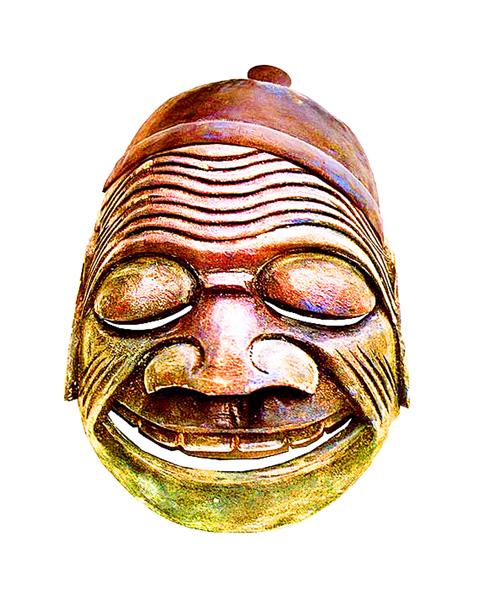
PHOTO COURTESY OF TAIPEI ARTS INTERNATIONAL ASSOCIATION
The award-winning script, written by Chinese theater practitioner and theorist Huang Wei-ruo (黃維若), humorously follows the lives of two men who are affected by the government’s attempt to modernize China’s backward society and, in the process, maintain power.
The first is the executioner and torturer “Fast Knife Ma” (Ma Kuai-dao, 馬快刀). Hailed throughout the region as a professional torturer who inflicts the maximum amount of pain on his victims by shearing off their flesh with a variety of knives — a process known as lingchi (“death by a thousand cuts,” 凌遲) — Ma revels in the adulation that crowds of bystanders bestow on him while engaged in this work.
Xu Shen-yu (徐聖喻) is an unaccomplished scholar who has passed the county examination, a minor test that confers a modicum of reputation on the candidate. But Xu has dreams of becoming a famous official in the imperial bureaucracy and spends all his money preparing for and sitting the provincial examinations, which he always fails. Penniless, he takes a job at a private school to prepare students for the examination he himself has passed.
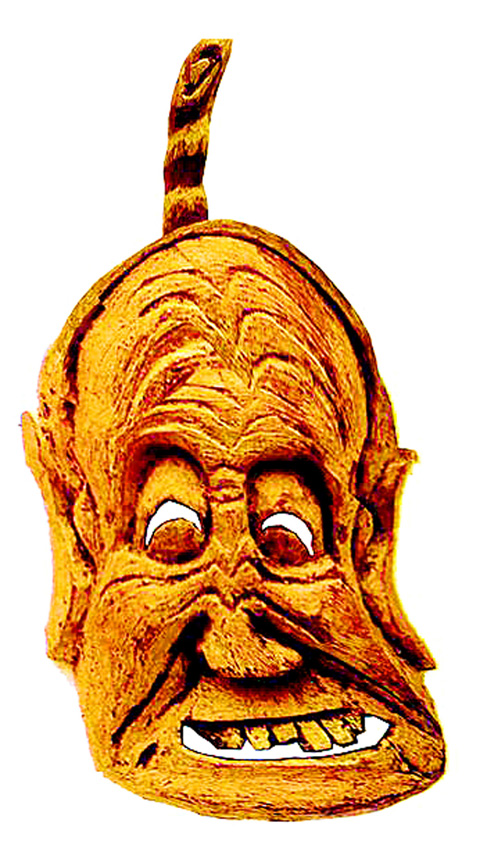
PHOTO COURTESY OF TAIPEI ARTS INTERNATIONAL ASSOCIATION
One day, Fast Knife Ma’s fantasies of slicing up his neighbor are interrupted by an imperial edict abolishing the national examination system and death sentence. Fast Knife immediately goes into a depression that is only alleviated when his wife, Zhi Zi-hua (梔子花), convinces him to begin a new, and to Ma, less honorable profession: that of a butcher.
At first, Ma finds his job boring — the squeals of the animals are no substitute for the screams of his former victims — but soon gains a certain degree of satisfaction through the process of removing flesh from bone. As Ma’s skills as a butcher improve, he draws the same crowds he did in his former incarnation as torturer and executioner.
With Ma’s newfound success he convinces Xu to quit his job as private tutor and become a butcher as well — an interesting social reversal because the butcher now becomes teacher to the scholar. Tension is also created because the audience is unsure whether Ma will skin his neighbor.
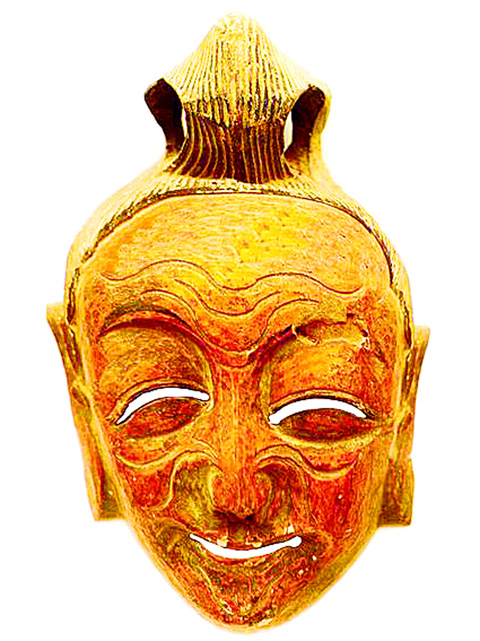
PHOTO COURTESY OF TAIPEI ARTS INTERNATIONAL ASSOCIATION
The play’s comic flavor is enhanced by Huang Hai-wei’s (黃海威) hand-carved wooden masks, which are inspired by the nuo (儺) masks of Sichuan Opera and Italian commmedia. With the exception of the scholar, executioner and his wife, all characters on the stage wear masks — another interesting reversal because in traditional Chinese theater only the lead characters on stage would wear masks.
But does the butcher end up living out his fantasies? You’ll have to watch the show to find out.
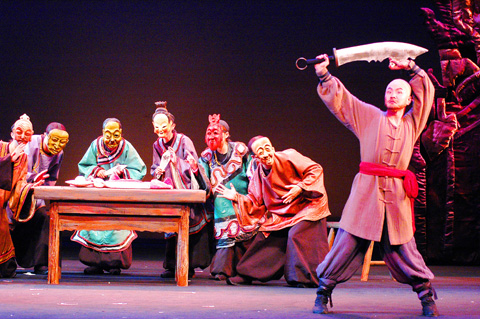
PHOTO COURTESY OF TAIPEI ARTS INTERNATIONAL ASSOCIATION
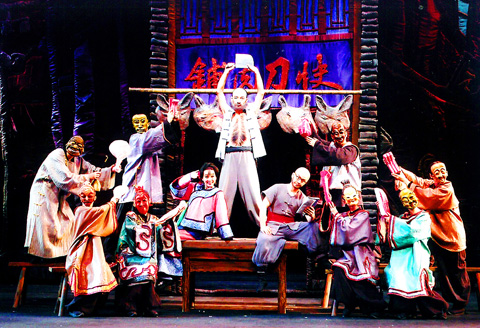
PHOTO COURTESY OF TAIPEI ARTS INTERNATIONAL ASSOCIATION
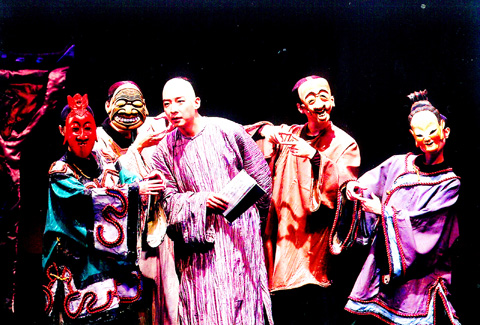
PHOTO COURTESY OF TAIPEI ARTS INTERNATIONAL ASSOCIATION

This month the government ordered a one-year block of Xiaohongshu (小紅書) or Rednote, a Chinese social media platform with more than 3 million users in Taiwan. The government pointed to widespread fraud activity on the platform, along with cybersecurity failures. Officials said that they had reached out to the company and asked it to change. However, they received no response. The pro-China parties, the Chinese Nationalist Party (KMT) and Taiwan People’s Party (TPP), immediately swung into action, denouncing the ban as an attack on free speech. This “free speech” claim was then echoed by the People’s Republic of China (PRC),

Exceptions to the rule are sometimes revealing. For a brief few years, there was an emerging ideological split between the Democratic Progressive Party (DPP) and Chinese Nationalist Party (KMT) that appeared to be pushing the DPP in a direction that would be considered more liberal, and the KMT more conservative. In the previous column, “The KMT-DPP’s bureaucrat-led developmental state” (Dec. 11, page 12), we examined how Taiwan’s democratic system developed, and how both the two main parties largely accepted a similar consensus on how Taiwan should be run domestically and did not split along the left-right lines more familiar in

Specialty sandwiches loaded with the contents of an entire charcuterie board, overflowing with sauces, creams and all manner of creative add-ons, is perhaps one of the biggest global food trends of this year. From London to New York, lines form down the block for mortadella, burrata, pistachio and more stuffed between slices of fresh sourdough, rye or focaccia. To try the trend in Taipei, Munchies Mafia is for sure the spot — could this be the best sandwich in town? Carlos from Spain and Sergio from Mexico opened this spot just seven months ago. The two met working in the

Many people in Taiwan first learned about universal basic income (UBI) — the idea that the government should provide regular, no-strings-attached payments to each citizen — in 2019. While seeking the Democratic nomination for the 2020 US presidential election, Andrew Yang, a politician of Taiwanese descent, said that, if elected, he’d institute a UBI of US$1,000 per month to “get the economic boot off of people’s throats, allowing them to lift their heads up, breathe, and get excited for the future.” His campaign petered out, but the concept of UBI hasn’t gone away. Throughout the industrialized world, there are fears that